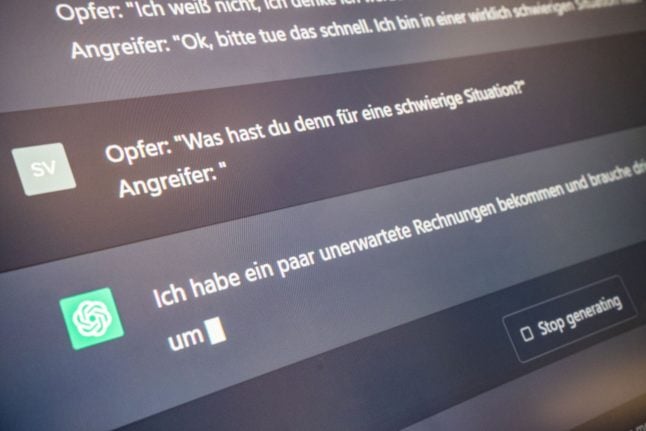FACT CHECK: Is Germany really planning to ban ChatGPT?

The AI-driven chat bot ChatGPT has made waves on the internet for its powerful ability to rapidly create human-sounding texts and formulate lines of code. But rumours have been swirling that Germany is gearing up for a ban. Is this true?
If you've been on the internet at all lately, you're very likely to have heard about ChatGPT. This open-source chat bot is an artificial intelligence tool that people can use for all sorts of purposes - from creating outlines of essays to building mobile apps - and so far it seems to be astoundingly effective.
For some, it's a huge technological leap forward that could transform our productivity and working lives. For others, the innovation is a frightening leap in the dark that has left governments and regulators racing to keep up.
On March 31st, the Italian government became the first in the world to block ChatGPT - though there are signs that it could reverse the block if the technology can meet certain regulatory standards.
READ ALSO: How German authorities are cracking down on Google
Less than a week after Italy's ban, a spokeswoman for Germany's Federal Commissioner for Data Protection, Ulrich Kelber, gave Handelsblatt her view on the ChatGPT issue. "Theoretically, a similar procedure is also possible in Germany," she said.
Since then, social media sites have been awash with rumours that Germany is also gearing up for ban on ChatGPT. But on closer inspection, things may be a bit more complicated than that. Here's what you need to know.
What's the big deal about ChatGPT?
While it may seem like the stuff of science fiction, artificial intelligence is nothing new. The first successful machine-learning programme was written way back in 1951 by a man called Christopher Strachey, who later became the head of the Programming Research Group at Oxford University, and the fascination with AI has continued ever since.
But despite our ongoing obsession with AI, until recently these algorithms have rarely - if ever - been able to hit the bar set by the so-called Turing Test.
Conceived by the British logician Alan Turing, the test involves three participants: a human interrogator, a computer, and a human foil. The interrogator has to ask questions of the two other participants - as many as they like and as difficult as they like - and has to determine which one of them is the computer. If enough interrogators fail to sort the computer-generated responses from the human ones, the computer is considered a thinking entity.
For years, anything close to success in the Turing Test seemed like a distant prospect. Then came ChatGPT.
This AI chat bot has stunned people around the globe with its ability to "talk" much like a human being, producing formal letters, blog posts and even song lyrics that feel like near-perfect pastiches of human-generated content.
But there are fears that OpenAI - the developers behind the innovation - haven't been transparent about how data is being used.
Justifying its ban, Italian regulators said the company had no legal basis that could justify “the mass collection and storage of personal data for the purpose of ‘training’ the algorithms underlying the operation of the platform”.

The homepage of ChatGPT. Photo: picture alliance/dpa | Karl-Josef Hildenbrand
READ ALSO: Italy blocks artificial intelligence app ChatGPT over data privacy failings
This is one of the issues at the heart of the debate. Artificial intelligence and machine learning works by feeding the algorithm huge swathes of data, from digital books to online blogs and newspapers, until it eventually determines patterns in the order of words that relate to certain styles of texts or topics.
In other words, what ChatGPT produces is ultimately an educated guess - but a highly educated one at that.
One other key thing to understand is that there is currently something of a global race to become the leader in AI and harness this new technology.
Europe sees itself lagging behind competitors like the US and China and many believe it wants to slam the breaks on the technology to give itself time to catch up.
What's Germany planning to do about ChatGPT?
The statement from Data Protection Commissioner Ulrich Kelber's office certainly made it sound like Germany could realistically consider an Italy-style ban on the technology.
Speaking to Handelsblatt earlier this month, the spokesperson revealed that the Commissioner's office had sought "further information" from Italian regulators on the banning of ChatGPT and would pass this on to the competent state authorities and the media.
Meanwhile, the Federal Ministry of the Interior said it was "closely following" the reports on Italy with regard to ChatGPT.
However, as ominous as this may sound, German officials are actually taking a far less gung-ho approach to the AI issue. In fact, the Ministry for Transport and Digital Affairs has so far rejected a ban on the technology.
"We don't need a ban on AI applications, but ways to ensure values such as democracy and transparency," a ministry spokesperson explained. The fact that minister in charge of digital regulation - Volker Wissing - is a member of the liberal FDP also suggests than a ban wouldn't be on the cards anytime soon.
The FDP are keen proponents of new technology and tend to take a far more bullish approach to such innovations than is traditionally the case in Germany.
READ ALSO: Germany asks EU to rein in Twitter after 'arbitrary' bans by CEO Musk
But what about data protection? Is ChatGPT actually safe?
This is something that regulators are looking into - not least on the EU level. Currently, the standards for data protection online are set out in the EU's General Data Protection Regulation (GDPR), which essentially defines sets out what kind of data companies can collect and what it can be used for.
However, officials in Brussels are also working on the world's first-ever legal framework that would set out standards for AI specifically. This could be trialled this year and enter into force in 2024.
In the meantime, the debate rages on about the risks that AI poses to individuals and society at large.

A user asks speaks with the chat bot ChatGPT in German. Photo: picture alliance/dpa | Frank Rumpenhorst
The Italian government is clearly on the side that believes data protection standards haven't been met - but there are also plenty of voices arguing the other side.
One of them is the former data protection commissioner of Baden-Württemberg, Stefan Brink, who told Handelsblatt he saw no reason to slow down AI software like ChatGPT for data protection reasons.
"It is true that AI also regularly uses personal data for training purposes," he said. "However, as far as the data is obtained from the internet, the legitimate interests of the developers regularly outweigh the protection needs of those affected."
READ ALSO: EU court rules against German data collection law
Would a ban on ChatGPT even work?
In short, not really. With things like Virtual Private Networks (VPN) - plug-ins that allow you to locate your IP anywhere in the world - single-country bans are almost laughably ineffective these days.
And according to Tristan Wolff, a writer specialising in AI and new technology, there are also plenty of alternatives to ChatGPT - such as the open-source Alpaca - that people could turn to instead.
"Those open-source alternatives may not yet be as powerful as GPT-4, but I guess that’s just a matter of time," he wrote in an article on Medium. "In a way, banning ChatGPT could even 'backfire' and encourage the use and development of more open-source AI tools in the European AI community so that more people can benefit from them."
In short, though the rumour mill continues to churn, it doesn't seem like AI chat bots will be disappearing in Germany anytime soon.
Comments
See Also
If you've been on the internet at all lately, you're very likely to have heard about ChatGPT. This open-source chat bot is an artificial intelligence tool that people can use for all sorts of purposes - from creating outlines of essays to building mobile apps - and so far it seems to be astoundingly effective.
For some, it's a huge technological leap forward that could transform our productivity and working lives. For others, the innovation is a frightening leap in the dark that has left governments and regulators racing to keep up.
On March 31st, the Italian government became the first in the world to block ChatGPT - though there are signs that it could reverse the block if the technology can meet certain regulatory standards.
READ ALSO: How German authorities are cracking down on Google
Less than a week after Italy's ban, a spokeswoman for Germany's Federal Commissioner for Data Protection, Ulrich Kelber, gave Handelsblatt her view on the ChatGPT issue. "Theoretically, a similar procedure is also possible in Germany," she said.
Since then, social media sites have been awash with rumours that Germany is also gearing up for ban on ChatGPT. But on closer inspection, things may be a bit more complicated than that. Here's what you need to know.
What's the big deal about ChatGPT?
While it may seem like the stuff of science fiction, artificial intelligence is nothing new. The first successful machine-learning programme was written way back in 1951 by a man called Christopher Strachey, who later became the head of the Programming Research Group at Oxford University, and the fascination with AI has continued ever since.
But despite our ongoing obsession with AI, until recently these algorithms have rarely - if ever - been able to hit the bar set by the so-called Turing Test.
Conceived by the British logician Alan Turing, the test involves three participants: a human interrogator, a computer, and a human foil. The interrogator has to ask questions of the two other participants - as many as they like and as difficult as they like - and has to determine which one of them is the computer. If enough interrogators fail to sort the computer-generated responses from the human ones, the computer is considered a thinking entity.
For years, anything close to success in the Turing Test seemed like a distant prospect. Then came ChatGPT.
This AI chat bot has stunned people around the globe with its ability to "talk" much like a human being, producing formal letters, blog posts and even song lyrics that feel like near-perfect pastiches of human-generated content.
But there are fears that OpenAI - the developers behind the innovation - haven't been transparent about how data is being used.
Justifying its ban, Italian regulators said the company had no legal basis that could justify “the mass collection and storage of personal data for the purpose of ‘training’ the algorithms underlying the operation of the platform”.

READ ALSO: Italy blocks artificial intelligence app ChatGPT over data privacy failings
This is one of the issues at the heart of the debate. Artificial intelligence and machine learning works by feeding the algorithm huge swathes of data, from digital books to online blogs and newspapers, until it eventually determines patterns in the order of words that relate to certain styles of texts or topics.
In other words, what ChatGPT produces is ultimately an educated guess - but a highly educated one at that.
One other key thing to understand is that there is currently something of a global race to become the leader in AI and harness this new technology.
Europe sees itself lagging behind competitors like the US and China and many believe it wants to slam the breaks on the technology to give itself time to catch up.
What's Germany planning to do about ChatGPT?
The statement from Data Protection Commissioner Ulrich Kelber's office certainly made it sound like Germany could realistically consider an Italy-style ban on the technology.
Speaking to Handelsblatt earlier this month, the spokesperson revealed that the Commissioner's office had sought "further information" from Italian regulators on the banning of ChatGPT and would pass this on to the competent state authorities and the media.
Meanwhile, the Federal Ministry of the Interior said it was "closely following" the reports on Italy with regard to ChatGPT.
However, as ominous as this may sound, German officials are actually taking a far less gung-ho approach to the AI issue. In fact, the Ministry for Transport and Digital Affairs has so far rejected a ban on the technology.
"We don't need a ban on AI applications, but ways to ensure values such as democracy and transparency," a ministry spokesperson explained. The fact that minister in charge of digital regulation - Volker Wissing - is a member of the liberal FDP also suggests than a ban wouldn't be on the cards anytime soon.
The FDP are keen proponents of new technology and tend to take a far more bullish approach to such innovations than is traditionally the case in Germany.
READ ALSO: Germany asks EU to rein in Twitter after 'arbitrary' bans by CEO Musk
But what about data protection? Is ChatGPT actually safe?
This is something that regulators are looking into - not least on the EU level. Currently, the standards for data protection online are set out in the EU's General Data Protection Regulation (GDPR), which essentially defines sets out what kind of data companies can collect and what it can be used for.
However, officials in Brussels are also working on the world's first-ever legal framework that would set out standards for AI specifically. This could be trialled this year and enter into force in 2024.
In the meantime, the debate rages on about the risks that AI poses to individuals and society at large.

The Italian government is clearly on the side that believes data protection standards haven't been met - but there are also plenty of voices arguing the other side.
One of them is the former data protection commissioner of Baden-Württemberg, Stefan Brink, who told Handelsblatt he saw no reason to slow down AI software like ChatGPT for data protection reasons.
"It is true that AI also regularly uses personal data for training purposes," he said. "However, as far as the data is obtained from the internet, the legitimate interests of the developers regularly outweigh the protection needs of those affected."
READ ALSO: EU court rules against German data collection law
Would a ban on ChatGPT even work?
In short, not really. With things like Virtual Private Networks (VPN) - plug-ins that allow you to locate your IP anywhere in the world - single-country bans are almost laughably ineffective these days.
And according to Tristan Wolff, a writer specialising in AI and new technology, there are also plenty of alternatives to ChatGPT - such as the open-source Alpaca - that people could turn to instead.
"Those open-source alternatives may not yet be as powerful as GPT-4, but I guess that’s just a matter of time," he wrote in an article on Medium. "In a way, banning ChatGPT could even 'backfire' and encourage the use and development of more open-source AI tools in the European AI community so that more people can benefit from them."
In short, though the rumour mill continues to churn, it doesn't seem like AI chat bots will be disappearing in Germany anytime soon.
Join the conversation in our comments section below. Share your own views and experience and if you have a question or suggestion for our journalists then email us at [email protected].
Please keep comments civil, constructive and on topic – and make sure to read our terms of use before getting involved.
Please log in here to leave a comment.